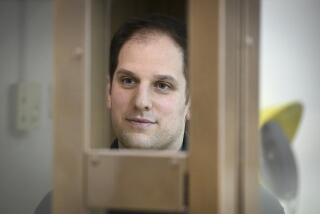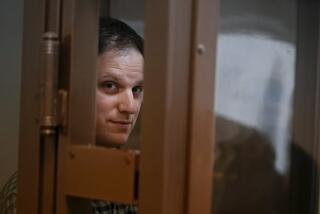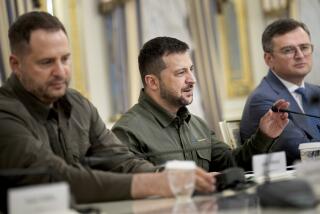Prodded by Kremlin, U.S. ambassador to Moscow returns to Washington for consultations

- Share via
MOSCOW — The U.S. ambassador in Moscow said Tuesday he will head home for consultations — a move that comes after the Kremlin prodded him to take a break after Washington and Moscow traded sanctions and expulsions of diplomats.
The Kremlin emphasized that it couldn’t order Ambassador John Sullivan to leave for consultations and could only “recommend” that he do so amid the current tensions.
Sullivan said in a statement that he is returning to the United States this week to discuss U.S.-Russian ties with members of President Biden’s administration. He emphasized that he would come back to Moscow within weeks.
“I believe it is important for me to speak directly with my new colleagues in the Biden administration in Washington about the current state of bilateral relations between the United States and Russia,” Sullivan said in a statement issued by the embassy. “Also, I have not seen my family in well over a year, and that is another important reason for me to return home for a visit.”
Sullivan’s departure comes after Russia on Friday stopped short of asking him to leave the country but “suggested” that he follow the example of Moscow’s ambassador to Washington, who was recalled for consultations last month after Biden’s description of President Vladimir Putin as a “killer.” Russia has set no time frame for Anatoly Antonov’s return to Washington.
Putin’s spokesman, Dmitry Peskov, said the two ambassadors’ departures reflected current tensions in the relationship between the U.S. and Russia.
Defying Putin, backers of imprisoned Kremlin critic Alexei Navalny call for mass protests Wednesday
“The relations now have hit the bottom,” Peskov said. “There are certain consequences of the unfriendly measures taken against our country and the retaliatory measures taken by us.”
On Thursday, the Biden administration announced sanctions on Russia for interfering in the 2020 presidential election and involvement in the SolarWind hack of federal agencies, which Moscow has denied. The U.S. ordered 10 Russian diplomats expelled, targeted dozens of companies and people and imposed new curbs on Russia’s ability to borrow money.
Russia denounced the U.S. move as “absolutely unfriendly and unprovoked” and retaliated by ordering 10 U.S. diplomats to leave, blacklisting eight current and former U.S. officials and tightening requirements for the U.S. Embassy’s operations in Moscow.
While ordering the sanctions, Biden also called for de-escalating tensions and held the door open for cooperation with Russia in certain areas. Biden emphasized that he told Putin that he chose not to impose tougher sanctions for now and proposed to meet in a third country in the summer.
Breaking News
Get breaking news, investigations, analysis and more signature journalism from the Los Angeles Times in your inbox.
You may occasionally receive promotional content from the Los Angeles Times.
Russian Deputy Foreign Minister Sergei Ryabkov said that “we are in the very beginning of analyzing the situation” regarding Biden’s summit proposal and no specifics have been discussed yet. “A big question is what course the U.S. will take,” Ryabkov said in remarks carried by Russian news agencies.
Fyodor Lukyanov, a leading Moscow-based foreign policy expert, said while the Kremlin’s advice to Sullivan to leave for consultations stopped short of expulsion, it reflected Moscow’s dismay about the new sanctions.
“If the political contacts have been reduced to zero, and economic ties never were close enough, why have so many people in the embassies?” Lukyanov said in a commentary. He predicted that ties will continue to deteriorate despite Biden’s offer to hold a summit.
“During the past Cold War, the Soviet Union and the United States at least shared a certain mutual respect and a recognition of each other’s political legitimacy, and it’s no longer the case,” Lukyanov observed.
“Each party sees the other as heading toward decay and lacking the moral and political right to behave as it does,” he said.
More to Read
Sign up for Essential California
The most important California stories and recommendations in your inbox every morning.
You may occasionally receive promotional content from the Los Angeles Times.











